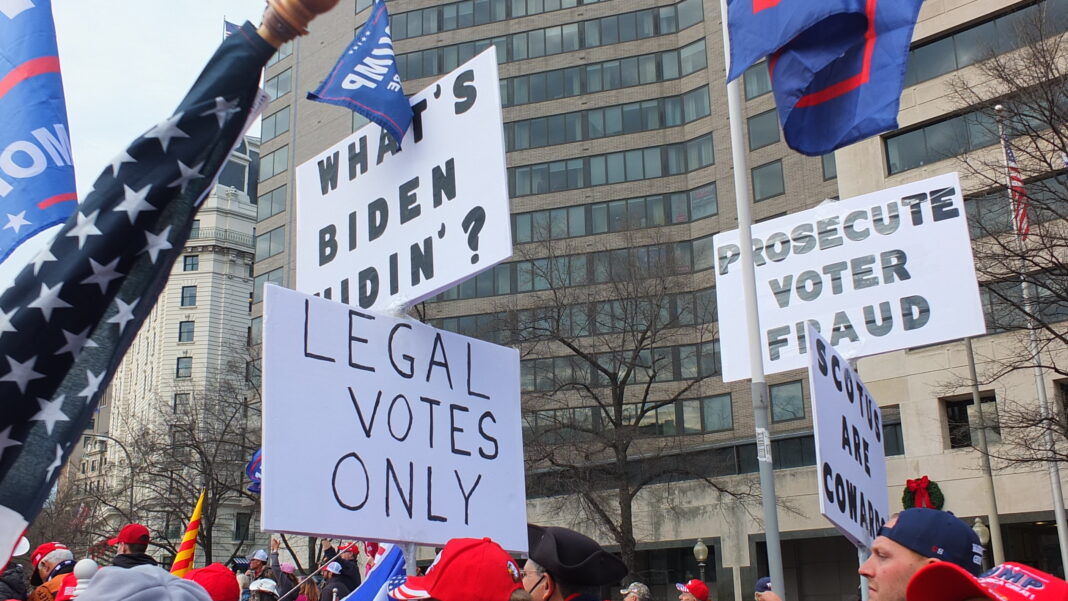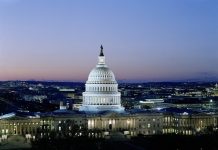By S.A. McCarthy
The Washington Stand
With only one week to go until Election Day, concerns over election integrity are ramping up across the nation. In Virginia, the Biden-Harris Department of Justice (DOJ) is trying to block the state from clearing noncitizens from its voter rolls, while the state is seeking assistance from the highest court in the land.
Earlier this year, Virginia Governor Glenn Youngkin (R) announced that over 6,300 noncitizens had already been removed from the state’s voter rolls and issued an executive order to remove another 1,600 “self-identified” noncitizens from the voter rolls. The DOJ sued Virginia earlier this month and Biden-appointed U.S. District Court Judge Patricia Giles blocked Virginia from removing noncitizens from the voter rolls.
Youngkin commented at the time, “Let’s be clear about what just happened: only eleven days before a Presidential election, a federal judge ordered Virginia to reinstate over 1,500 individuals — who self-identified themselves as noncitizens — back onto the voter rolls.” He added, “Almost all these individuals had previously presented immigration documents confirming their noncitizen status, a fact recently verified by federal authorities.”
Youngkin also noted that the state law requiring and allowing the removal of noncitizens from voter rolls was signed by Democrat Tim Kaine, then the governor of Virginia and later Hillary Clinton’s 2016 running mate, in 2006. “This law has been applied in every Presidential election by Republicans and Democrats since enacted 18 years ago,” Youngkin observed.
Virginia subsequently appealed Giles’s order to the U.S. Fourth Circuit Court of Appeals, which chose to uphold the District Court’s decree. Virginia’s Republican Attorney General Jason Miyares announced Sunday night that he had filed a petition with the U.S. Supreme Court, asking that Giles’s order be stayed and that Virginia be allowed to continue removing noncitizens from its voter rolls. “American citizens — and no one else — should determine American elections,” Miyares stated.
“The Department of Justice pulled this shameful, politically motivated stunt 25 days before Election Day, challenging a Virginia process signed into law 18 years ago by a Democrat governor and approved by the Department of Justice in 2006,” he said in a prior statement. Miyares continued, “More concerning is the open practice by the Biden-Harris administration to weaponize the legal system against the enemies of so-called progress. That is the definition of lawfare. To openly choose weaponization over good process and lawfare over integrity isn’t democracy: it’s bullying…”
In his appeal to the Supreme Court, Miyares explained that Virginia’s actions in no way violated state or federal law and that Giles’s order was predicated on a provision of the 1993 National Voter Registration Act (NVRA) that “does not even apply to the removal of noncitizens and other voter registrations that are void ab initio,” adding that “even if it did apply to the removal of noncitizens, Virginia’s program complied with it anyway.”
The attorney general further argued, “The injunction, which prohibits the application of a law that has been on the books since the Justice Department precleared it in 2006, will also irreparably injure Virginia’s sovereignty, confuse her voters, overload her election machinery and administrators, and likely lead noncitizens to think they are permitted to vote, a criminal [offense] that will cancel the franchise of eligible voters.”
The Biden-Harris DOJ also sued Alabama late last month for removing over 3,200 noncitizens from its voter rolls. Studies have estimated that anywhere from 1.5 million to 2.7 million noncitizens could wind up voting in this year’s election.
Virginia isn’t the only place where the Supreme Court’s intervention is being sought. The Republican National Committee (RNC) has asked the court to stop Pennsylvania from illegally counting provisional ballots. Pennsylvania’s Supreme Court previously ruled that provisional ballots may be counted even if the voter has already cast a ballot by mail. At issue are cases where Pennsylvania voters have had their mail-in ballots rejected due to errors such as not signing the ballot or not using the required secrecy envelope. County elections boards have determined, in accordance with state statute, that a voter’s error in casting a ballot is not sufficient reason to give that voter a provisional ballot, so neither the erroneous original ballot nor the provisional ballot is counted.
But Pennsylvania decided to count provisional ballots anyway, even when the original mail-in ballot was received before the election. Lawyers for the RNC argued in their petition to the U.S. Supreme Court that the Pennsylvania Supreme Court’s decision “effectively creates a cure process for mail-ballot errors — a process everyone agrees the General Assembly has deliberately chosen not to create.”
They continued, “This Court bears the constitutional responsibility of ensuring that state courts do not ‘unconstitutionally intrude upon the role specifically reserved to state legislatures by Article I, Section 4, of the Federal Constitution.’” The lawyers added, “By any standard, however deferential, that line has been crossed here: When the legislature says that certain ballots can never be counted, a state court cannot blue-pencil that clear command into always.”
The correct counting of mail-in ballots has proven to be contentious in other states, too. Nevada’s Supreme Court determined on Monday that mail-in ballots can be counted for up to three days after Election Day itself, even if those ballots are missing a postmark. However, the U.S. Fifth Circuit Court of Appeals ruled on Friday that no mail-in ballots may be counted that have been received after Election Day, even if they are postmarked on Election Day itself. But since the federal court did not issue an order, the ruling is unlikely to have an effect on ballot counting in the 2024 election. The ruling will not be handed down to a lower court until about a week and a half after Election Day.
Courts aren’t the only channel for diluting or bolstering election integrity either. In California, Governor Gavin Newsom (D) signed a law last month barring county and municipal governments from requiring identification to vote. The law comes despite a new survey showing that 84% of Americans support requiring a photo ID in order to obtain a ballot.
In Oregon and Washington, even more extreme election interference measures have been taken. As-yet-unidentified persons set fire to ballot drop boxes in Portland and in Vancouver, Washington, burning hundreds of ballots. The “politicalmath” X account noted that the Washington drop box set ablaze is in Clark County, which “is one of the more conservative counties in Washington, voting +8 more Republican than the state as a whole in 2020.”
















